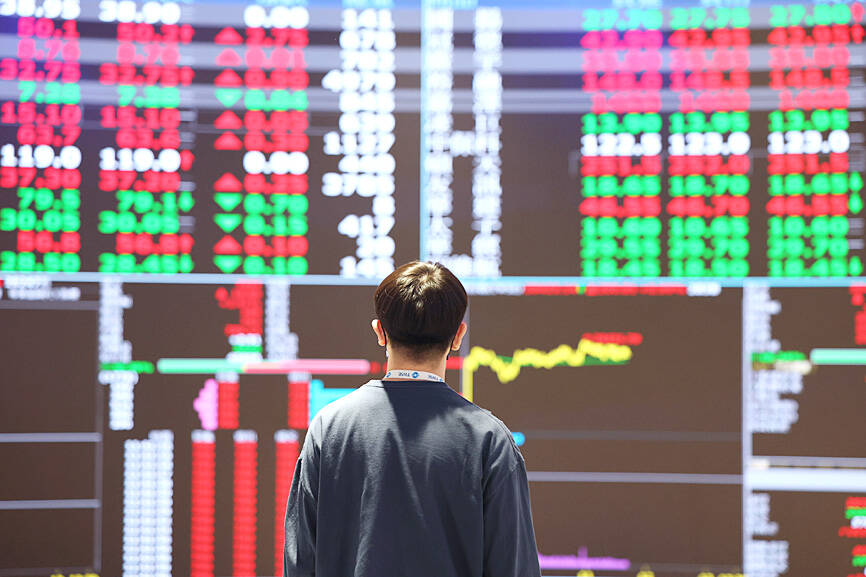The 924 Taiwanese and 80 overseas companies with primary listings on the Taiwan Stock Exchange (TWSE) reported combined pretax profit of NT$3.53 trillion (US$110.05 billion) for last year, down 25.96 percent from NT$4.76 trillion a year earlier, the exchange said yesterday.
The TWSE-listed firms generated NT$36.76 trillion in combined revenue, down 8.82 percent year-on-year from NT$40.31 trillion, the exchange said in a statement.
The decline in pretax profit came as listed companies encountered inventory adjustments amid a volatile and uncertain global economic environment, it said, citing factors such as inflation pressure, interest rate hikes by central banks globally and geopolitical tensions.

Photo: CNA
Listed companies that saw their profit drop last year were mainly those in the shipping, semiconductor and plastics sectors, it said.
However, 427 companies bucked the downtrend by posting gains in pretax profit, especially those in the financial services, automobile, and building material and construction sectors, due to improved market fundamentals, it added.
Financial services providers benefited from positive market conditions, which led to an increase in investment gains and handling fees last year, the TWSE said.
Firms in the automobile sector posted strong bottom lines last year due to improved supply of automotive chips and components, as well as the post-COVID-19 pandemic market boom, while newly completed houses contributed to profit increases in the building materials and construction sector, it said.
Meanwhile, the combined pretax profit of the 819 companies on the over-the-counter Taipei Exchange (TPEX) fell 20.93 percent to NT$265.6 billion last year, while their combined revenue dropped 6.18 percent to NT$2.55 trillion, the smaller exchange said in a separate statement.
The TPEX said that 308 firms posted higher profit than the previous year, led by those in the building materials and construction, financial services and tourism sectors.
Despite the decline in combined pretax profit, there are still many over-the-counter companies with sound fundamentals that deserve investors’ attention, it said, adding that 51 companies’ earnings per share (EPS) exceeded NT$10 and 106 firms’ EPS were between NT$5 and NT$10, while 181 were between NT$2 and NT$5.

SEEKING CLARITY: Washington should not adopt measures that create uncertainties for ‘existing semiconductor investments,’ TSMC said referring to its US$165 billion in the US Taiwan Semiconductor Manufacturing Co (TSMC, 台積電) told the US that any future tariffs on Taiwanese semiconductors could reduce demand for chips and derail its pledge to increase its investment in Arizona. “New import restrictions could jeopardize current US leadership in the competitive technology industry and create uncertainties for many committed semiconductor capital projects in the US, including TSMC Arizona’s significant investment plan in Phoenix,” the chipmaker wrote in a letter to the US Department of Commerce. TSMC issued the warning in response to a solicitation for comments by the department on a possible tariff on semiconductor imports by US President Donald Trump’s

The government has launched a three-pronged strategy to attract local and international talent, aiming to position Taiwan as a new global hub following Nvidia Corp’s announcement that it has chosen Taipei as the site of its Taiwan headquarters. Nvidia cofounder and CEO Jensen Huang (黃仁勳) on Monday last week announced during his keynote speech at the Computex trade show in Taipei that the Nvidia Constellation, the company’s planned Taiwan headquarters, would be located in the Beitou-Shilin Technology Park (北投士林科技園區) in Taipei. Huang’s decision to establish a base in Taiwan is “primarily due to Taiwan’s talent pool and its strength in the semiconductor

An earnings report from semiconductor giant and artificial intelligence (AI) bellwether Nvidia Corp takes center stage for Wall Street this week, as stocks hit a speed bump of worries over US federal deficits driving up Treasury yields. US equities pulled back last week after a torrid rally, as investors turned their attention to tax and spending legislation poised to swell the US government’s US$36 trillion in debt. Long-dated US Treasury yields rose amid the fiscal worries, with the 30-year yield topping 5 percent and hitting its highest level since late 2023. Stocks were dealt another blow on Friday when US President Donald

UNCERTAINTY: Investors remain worried that trade negotiations with Washington could go poorly, given Trump’s inconsistency on tariffs in his second term, experts said The consumer confidence index this month fell for a ninth consecutive month to its lowest level in 13 months, as global trade uncertainties and tariff risks cloud Taiwan’s economic outlook, a survey released yesterday by National Central University found. The biggest decline came from the timing for stock investments, which plunged 11.82 points to 26.82, underscoring bleak investor confidence, it said. “Although the TAIEX reclaimed the 21,000-point mark after the US and China agreed to bury the hatchet for 90 days, investors remain worried that the situation would turn sour later,” said Dachrahn Wu (吳大任), director of the university’s Research Center for